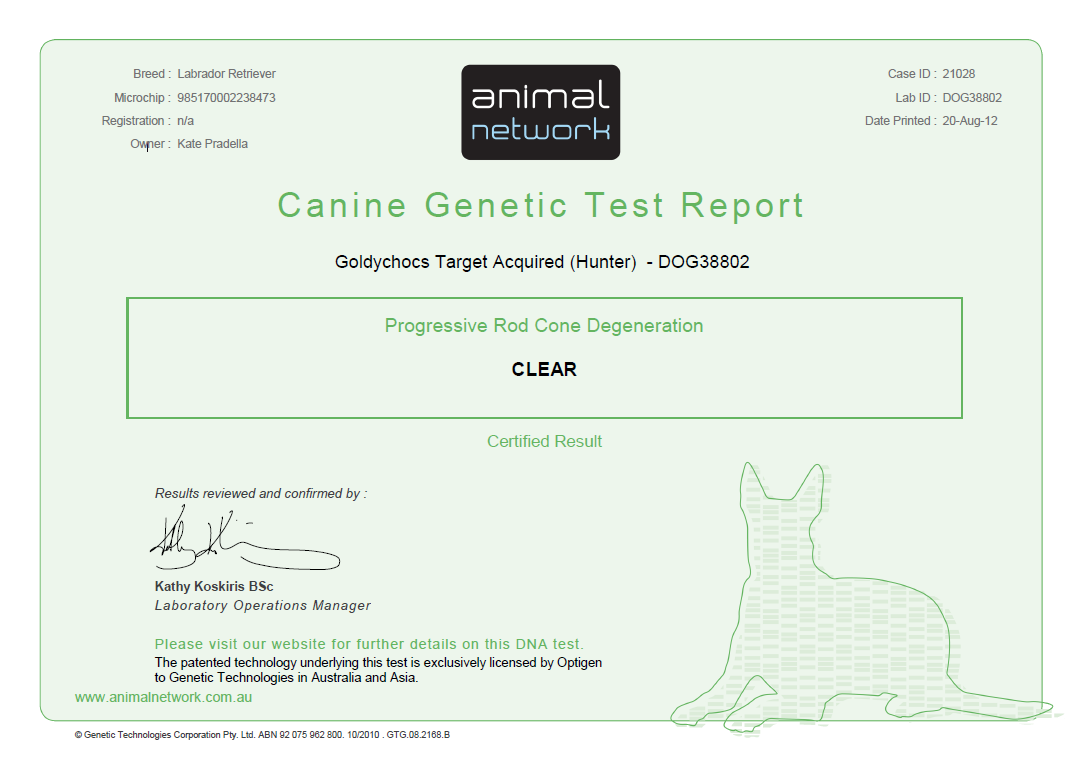DNA Tests
Why DNA testing?
Responsible dog breeders go to the effort and expense of DNA testing their potential breeding dogs for known hereditary diseases common to their chosen breed. Through testing and identification of diseases, a breeder can make responsible breeding choices to eliminate the possibility of producing puppies that are affected by these known diseases. In the past, breeders did not have DNA tests available to them and relied totally on experience with their own dogs and feedback from puppy buyers to understand health traits in their dogs. They also relied upon the honesty of other breeders when choosing stud dogs that were owned by someone else. Even those that kept very thorough records and followed up on all the health history of dogs produced could not be entirely confident about what was causing common symptoms or problems. This is due to the fact that many diseases can be "carried" through generations without actually presenting symptoms. One parent dog can carry a disease all of its breeding life and still never produce a puppy with the disease. Another parent dog can carry a disease and produce the disease in all of its offspring. It all depends on who the dog is bred to. Both parents have to carry or be affected by the disease to actually produce puppies that are affected (get symptoms) of the disease. Therefore a disease can effectively go undetected for numerous generations until a carrier is mated to another carrier or affected dog - then affected puppies can be produced.
DNA testing takes the guess work out altogether. A breeder can accurately determine what their dogs carry and make breeding choices accordingly to avoid ever producing affected puppies.
I must stress that these DNA tests are NOT compulsory, nor are they currently required for registration through the ANKC. Therefore, you could still currently purchase a Labrador Retriever puppy through a registered breeder here in Australia and your puppy COULD be affected by a well-known genetic disease. This is one very important reason why it is critical to do your homework and research when choosing any breeder and ask to see certification of DNA results for both parents of your chosen puppy.

There are currently two DNA tests that are routinely done by most reputable Labrador Retriever registered breeders -
PRA (PRCD) and EIC.
What is PRA (PRCD)?
PRA (PROGRESSIVE RETINAL ATROPHY) is a group of hereditary eye diseases that causes degeneration of the retina over time which usually leads to complete blindness. PRCD (PROGRESSIVE ROD-CONE DEGENERATION) is the form of PRA that is commonly known to affect Labrador Retrievers. Characteristically, this form of the disease starts to cause night blindness in AFFECTED dogs from about the age of three and leads to complete blindness from the age of six.
What is EIC?
EIC (EXERCISE INDUCED COLLAPSE) is a genetic syndrome that has been found in Labrador Retrievers and a few other retrieving breeds. AFFECTED dogs MAY display symptoms of muscle weakness through to complete collapse for short periods after intensive exercise or excitement. The problem is most commonly found in working/retrieving dogs and is noticed in fit and healthy dogs as well as unfit dogs of either sex. Dogs AFFECTED by EIC are generally unsuitable as working dogs but usually make perfectly happy house pets.
What to look for - what you need to know when choosing a puppy for a pet?
1. Your puppy must be AFFECTED by a hereditary disease for it to develop symptoms of the disease. That is, IF your puppy was DNA tested, it would have to return a result of "AFFECTED" for it to actually have the disease.
AND
2. As long as at least ONE of your puppy's parents is genetically tested as "CLEAR" from a genetic disease, your puppy CANNOT be AFFECTED by the disease.
THEREFORE,
Choose a breeder that DNA tests their breeding stock for the above hereditary diseases and ensure that at least one of the parents of your planned puppy is "Certified CLEAR" of both diseases. That way, you can be confident you won't end up with a dog AFFECTED by either of the above conditions.
**Note: If you intend to purchase a puppy for future breeding, I recommend requesting DNA testing (at your expense) of any prospective puppy. This way you can make a more informed decision about the suitability of the puppy for your own breeding program. Certified testing can be carried out at any age once the puppy is microchipped.
